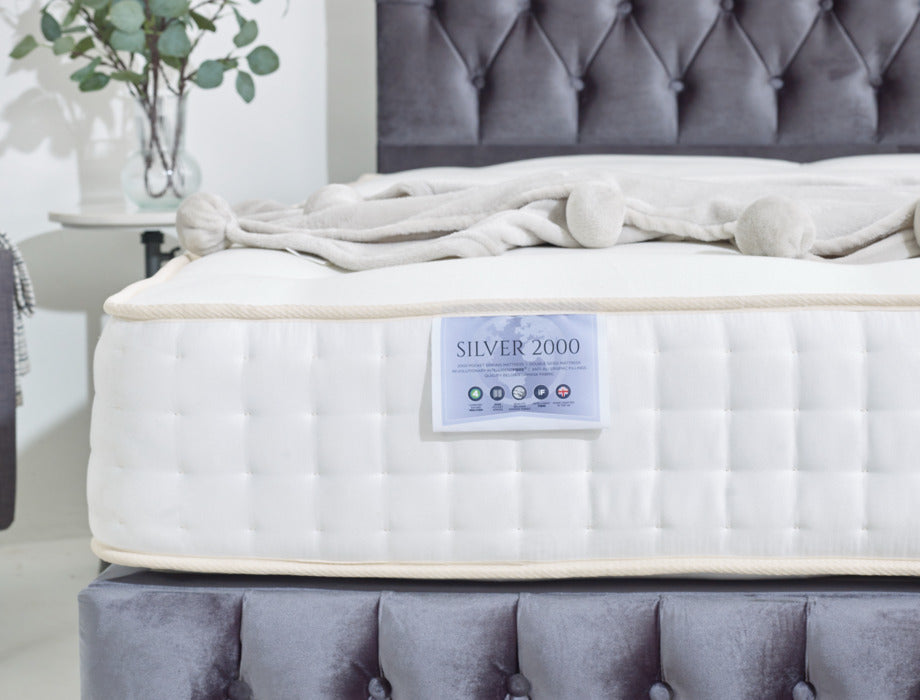Your bag is empty
How often should I change my mattress?
Posted:
Jump To

On average we spend a third lifetime asleep or in bed, if your mattress is 7 years old it will have clocked over 20,000 hours of sleep, absorbed a bath full of moisture which equates to half a pint every night. Per year we shed 1 LB (450g) of dead skin that's half a stone in 7 years. That's is shocking right ! taking all the above into consideration we at comfybedss recommend changing your mattress every 7 to 8 years.
Reasons to change your mattress
We know all there is about mattresses. We would like to share several reasons why you need to replace your mattress every 7 – 8 years you may squeeze more years out of our premium mattresses.
-
Sagging and dipping
Overtime materials that are involved within the construction of a mattress start to give out, for example open coil springs soften, foam cells break down, natural wool densifies. This causes the sagging and dipping effect which disrupts sleeping patterns and toss who toss and turn.
-
Disturbed sleep and insomnia
As mentioned above a mattress starts to loose all of its beneficial properties causing the undesirable sags and dips, leading to sleeping patterns being disturbed troubles falling asleep and overwhelming fatigue in the morning.
-
Bed bugs and dust mites
No matter how well we maintain our mattress or bed sheets eventually a mattress does become dirty. dead skin cells, body hair, pollen, spillages all start to gather within a mattress causing health conditions and irritations
-
Lifestyle changes
In 7-8 years time a lot could change for example gaining weight loosing weight. maybe you might have to start thinking about a partner who you share your nights with or maybe back aches have started occurring weather its down to stress from a new job or just age.
-
Unpleasant sounds
As mentioned above the materials involved start to give way for example open coil springs start to loosen. the bed may begin squeaking such sounds may wake you up especially if you're a light sleeper. Such sounds will disturb sleeping patterns.
-
Aches and pains
If you are waking up in the morning with neck and back pains which go away with a gentle stretch it maybe a sign of replacing your current mattress. If you have chosen a good quality mattress and the right mattress for you this shouldn't be the case as a mattress helps relief pressure from these points.
Risks of sleeping on a bad mattress
A mattress is a fundamental part of our life and due to the amount of time spent it can significantly contribute to our wellbeing. the average mattress has a life span of 7-8 years depending on how well we look after the mattress. after this durations we are more prone to certain health risks.
-
Neck and back pain
Even our best mattress looses its integrity. eventually a mattress starts to sag and dip which is visibly noticeable. Due to the lack of support our bodies pressure points such as the neck and back aren't supported. such problem will effect people who toss and turn throughout the night disrupting sleeping patterns. to prolong this from happening and improving the lifecycle of a mattress it is recommended to regularly rotate a mattress and use the mattresses full surface area.
-
Bed bugs
As a mattress ages it becomes the prime location for bed bugs to habitat these insects bite and irritate the skin they attach themselves to the seams of the mattress making them impossible to remove. it is recommended to throw the mattress away and reinvest in a mattress due to the health risks attached.it is essential to clean and mattress protectors or bed linen at least every two weeks.
-
Bacteria mould
As a mattress ages it becomes the prime environment for bacteria and fungi to grow. these pathogens have the ability to cause extreme damage leading to skin infections, urinary tract infections and other serious viruses. Again to simply prevent this from happening clean your mattress regularly.
Posted:
 Divan Bases
Divan Bases Headboards
Headboards Furniture
Furniture Bedding
Bedding

